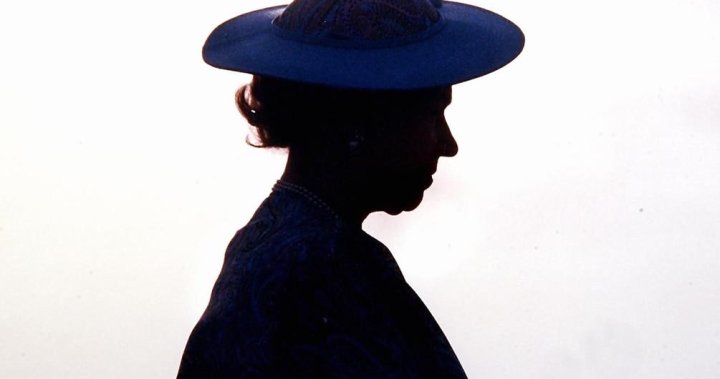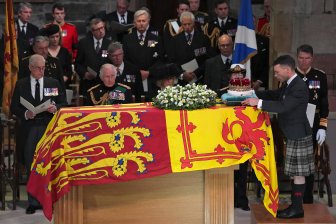Queen Elizabeth II’s legacy: Instead of mourning, many are questioning – National | Globalnews.ca
It may feel as though all of the world is mourning the death of Queen Elizabeth II, but for many people, her passing has renewed conversations around her complicated legacy and the British Royal Family’s role in colonialism and imperialism worldwide.
Members of the Royal Family were summoned to Balmoral Castle in Scotland last Thursday as news spread of the queen’s ailing health. Hours later, the world was informed of her death.
Many people immediately lamented the loss of Britain’s longest-reigning monarch, but for others, who continue to deal with the fallout and pain of colonialism, her death has revived feelings of anger and disdain.
A young girl holds a Paddington bear and a Corgi dog stuffed toys while waiting to watch the Procession of Queen Elizabeth’s coffin from the Palace of Holyroodhouse to St. Giles Cathedral on the Royal Mile in Edinburgh, Scotland, on Sept. 12, 2022.
John Super / The Associated Press
So, while a wave of sadness has undoubtedly swept the globe, it’s clear that the queen was not universally adored. She’s been criticized for actively participating in and holding up an institution that resulted in the loss of culture, land and lives in Canada, Africa, the Caribbean and Asia, among other places.
Others, however, point out that despite being a monarch, the queen was not Prime Minister and did not hold the power to make decisions regarding the administration of the country. Some argue that she was a prisoner of circumstance and was following the traditional duties and values that had been established for members of the Royal Family for centuries.
These supporters hold the view that the queen should be celebrated for her unwavering and steadfast “service” to her country.
Read more:
Canada announces a holiday to mark Queen Elizabeth’s death. Here’s who gets it
Read More
-
Canada announces a holiday to mark Queen Elizabeth’s death. Here’s who gets it
However, for those who subscribe to a postcolonial view, she stood for all the violence, oppression and theft imposed by the British colonial empire. Many believe she didn’t do enough to address her country’s problematic and violent past and that she missed the opportunity to discuss those harms and commit to reparations.
Critics have been highlighting her role in an empire that perpetuated racism, colonization and the suppression of movements calling for reconciliation and independence.
The height of the British Empire came just after World War One, when it had claimed approximately a quarter of the Earth’s surface and held sway over 23 per cent of the world’s population at the time.

In recent years, many of those colonies have begun to push back and some have gradually gained their independence from Britain.
There have been calls from Indigenous and Black communities, among others, to consider the extent to which she furthered the colonial agenda and well as to take a critical look at how much or little she did to right her family’s past wrongdoings.
The issue in Ireland
Ireland gained its independence from Britain in 1922, ending eight centuries of English political and military intervention for most of the nation. Northern Ireland, however, chose to stay part of the United Kingdom, leading to decades of violent clashes between nationalists who wished to be part of the republic and unionists who wanted to remain loyal to the crown.
Anne Marie Quilligan, a social care worker from Ireland’s Limerick region, tweeted Thursday that the mixed reactions from Irish and other people whose nations suffered under the British Empire were “collective trauma.”
“Unresolved trauma can become generational,” she wrote on Twitter. “Colonisation is a trauma.”
Irish Times correspondent Naomi O’Leary tweeted last week that while there may be unresolved anger, the Irish people largely sympathize with the British people over the loss of the queen.
The queen in 2011 became the first British monarch to visit the Republic of Ireland since it gained its independence. She made gestures of reconciliation for Britain’s bloody past in Ireland during a four-day state visit, culminating in a powerful and personal speech in which she expressed regret for centuries of conflict.
Despite the success of the 2011 goodwill trip, British-Irish relations became strained once again by Brexit, with the Irish people feeling as though their concerns have once again been placed on the backburner by the British.
Indigenous people in Canada and the monarchy
Closer to home, Indigenous communities in Canada are grappling with their own complicated feelings.
Canada’s Indian Act, which would see the formation of residential schools and the criminalizing of Indigenous culture, was passed in 1879 with help from the British parliament, and allowed the government sweeping powers in an attempt to assimilate First Nations peoples and communities.
Sol Sanderson, 80, former chief of the Federation of Sovereign Indigenous Nations, has spent nearly 65 years fighting to dismantle what he calls the “colonial suppression of Indigenous self-governance in Canada.”
Queen Elizabeth II is shown some moccasins by the Duke of Edinburgh after he was presented with them during their visit to the First Nations University in Regina.
Getty Images
He told Global News that he doesn’t believe the monarchy should be abolished or that Canada should cut ties with it, but says the British Royal Family needs to step up to calls for reconciliation.
Sanderson points to foundational precedents like a papal bull decreed in 1493 that enabled land inhabited by non-Christian people “discovered” by European explorers to be vanquished and the peoples to be subdued. He says it was used to validate the theft of Indigenous lands and resources, and set the stage for more than 500 years of systemic racism and cultural genocide.
Read more:
Majority of Canadians unaffected by Queen Elizabeth’s death: poll
“There has to be a new arrangement looked at in terms of agreement, a reconciliation-implementation agreement which provides for recognition of everything they denied in 1493 under that papal bull,” he said, adding he believes King Charles III supports Indigenous people in Canada and is hopeful for a better future.
The monarchy and Africa
“If anyone expects me to express anything but disdain for the monarch who supervised a government that sponsored the genocide that massacred and displaced half my family and the consequences of which those alive today are still trying to overcome, you can keep wishing upon a star,” Uju Anya, an associate professor of second language acquisition at Carnegie Mellon University, tweeted Thursday afternoon.
Anya, 46, is the daughter of Africa-born parents who met in England in the 1950s, when they were sent there from their respective countries to study as colonial subjects, she told NBC News. They married in England and returned to Nigeria.
“In addition to the colonization on the side of Nigeria, there’s also the human enslavement in the Caribbean,” Anya told NBC. “So there’s a direct lineage that I have to not just people who were colonized, but also people who were enslaved by the British.”
CNN reporter Larry Madowo noted the monarch’s death sparked mixed reactions on the African continent, with Kenya emerging as a vocal supporter for discussing the Queen Elizabeth’s “controversial” legacy.

“The fairytale is that Elizabeth went up the treetops here Kenya a princess and came down queen because it’s when she was here in Kenya that she learned her dad had died and she was to be the queen,” he explained, “But that also was the start of … for eight years after that, the British Colonial Government cracked down brutally on the Mau Mau against the colonial administration.”
“They herded over a million people into concentration camps where they were tortured and dehumanised.”
Madowo said that there’s been sentiment across the African continent that people refuse to mourn the queen because she never fully acknowledged the “great atrocities” African people suffered at the hands of the British.
He continued: “That is why, among African Twitter, among Black Twitter and other social media, there have been people who are uncomfortable with takes that maybe don’t quite follow the official state orthodoxy.”
The Caribbean disconnection
The issue of royal ties to colonialism was reignited once again earlier this year as senior royals undertook a series of international tours across the Commonwealth to mark the late queen’s Platinum Jubilee.
Prince William and Kate Middleton faced backlash as they toured Jamaica, Barbados and Belize in March, which was supposed to be a “charm offensive” tour intended to strengthen the U.K.’s ties with Commonwealth countries.
Catherine, Duchess of Cambridge and Prince William, Duke of Cambridge ride in a Land Rover as they attend the inaugural Commissioning Parade for service personnel from across the Caribbean with Prince William, Duke of Cambridge, at the Jamaica Defence Force on day six of the Platinum Jubilee Royal Tour of the Caribbean on March 24, 2022 in Kingston, Jamaica.
Samir Hussein / Getty Images
A group of Jamaican business leaders, doctors and politicians penned an open letter at the time, calling for slavery reparation payments and an apology for colonialism from the British monarchy.
“We note with great concern your visit to our country, Jamaica, during a period when we are still in the throes of a global pandemic and bracing for the full impact of another global crisis associated with the Russian/Ukraine war,” the letter, written by the Advocates Network, stated.
“We see no reason to celebrate 70 years of the ascension of your grandmother to the British throne because her leadership, and that of her predecessors, has perpetuated the greatest human rights tragedy in the history of humankind.”
Although the queen was historically regarded quite highly across the region, Britain is accused by many of — at best — a callous attitude towards its former colonies. That feeling has been heightened by the U.K.’s treatment of many Caribbean immigrants who went to Britain after the Second World War, helping to rebuild a war-shattered country.
Patricia Allen, Catherine, Duchess of Cambridge, Prince William, Duke of Cambridge and Governor General of Jamaica Sir Patrick Allen pose during a dinner reception at King’s House on March 23, 2022 in Kingston, Jamaica.
Samir Hussein / Getty Images
In recent years, some people from the Caribbean who had lived legally in Britain for decades were denied housing, jobs or medical treatment, and in some cases deported, because they didn’t have paperwork to prove their status.
The British government has apologized and agreed to pay compensation, but the scandal has caused deep anger, both in the U.K. and in the Caribbean. Some Caribbean nations have considered removing the queen as head of state, less than a year after Barbados cut ties and moved from a constitutional monarchy to a republic.
Jamaican Prime Minister Andrew Holness told Prince William that his country plans to become fully independent and will eventually remove the British head of state.

“We are moving on,” he said. “We intend to … fulfill our true ambitions and destiny as an independent, developed, prosperous country.”
During the tour, Prince William made a speech saying that slavery “should never have happened” and expressed his “profound sorrow” over the history of slavery in the country.
What happens next
Experts say that it’s possible to both admire and abhor public figures for their past actions, although it can make the grieving process more complex.
Dave Kessler, a grief specialist and founder of Grief.com, told USA Today the way people grieve is changing, especially with the popularity of social media, and that the lines of inappropriate and appropriate conversations about deceased figures is often blurred.
“There’s a movement shifting away from, ‘don’t talk badly about the dead,’ to ‘let’s talk about people more authentically.’ And these more authentic conversations include acknowledgement of both the good and bad in all of us,” he told the outlet, adding that it exemplifies the complexity of humankind.

Essayist Rebecca Solnit wrote on social media Saturday that “the death of the queen has become an occasion to revisit the intertwined histories of colonialism and slavery. Who the queen was as a person and whether she was herself a prisoner of circumstance are irrelevant; if you embody several centuries of royal history, it’s the inequalities, invasions, and subjugations as well as the pomp and circumstance.”
“The anticolonial discourse right now is about that embodiment of ‘tradition,’ and what that tradition actually consisted of,” she added.
Dr. Kisha Supernant, director of the Institute of Prairie and Indigenous Archaeology in Canada, told Global News that now’s the time to have these tough conversations.
“I think we’re at a very important moment to bring forth this conversation and if we have any hope of reconciliation, we have to remember that truth comes first and that includes any truth about the British monarchy and the British Empire … if there’s a moment to talk about legacy, it’s when someone passes,” Supernant said.
— With files from Global News’ Neetu Garcha

© 2022 Global News, a division of Corus Entertainment Inc.
For all the latest world News Click Here




